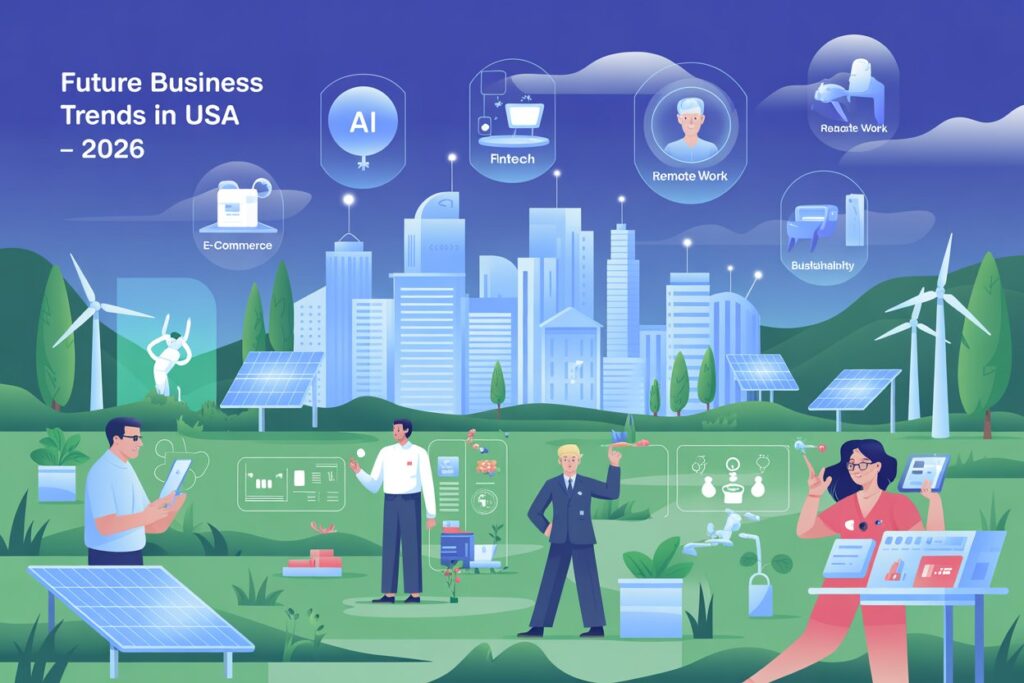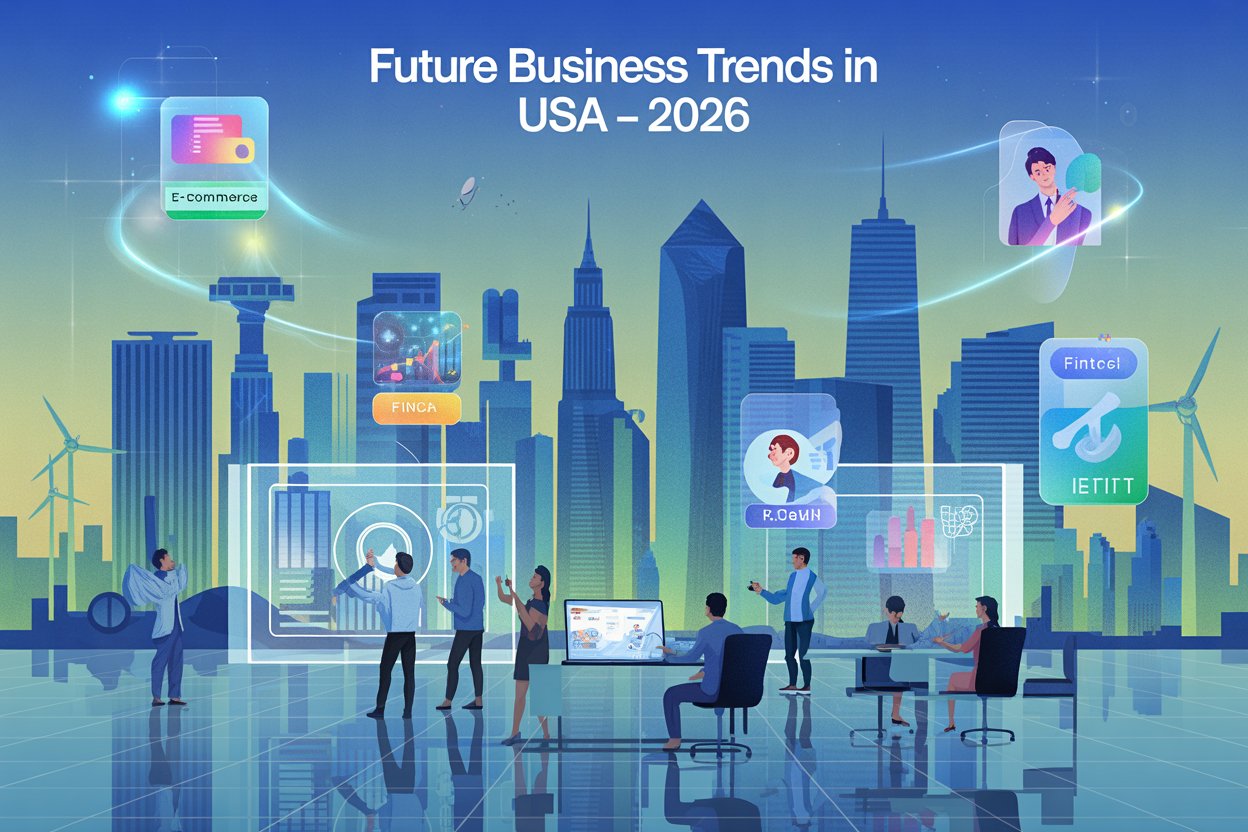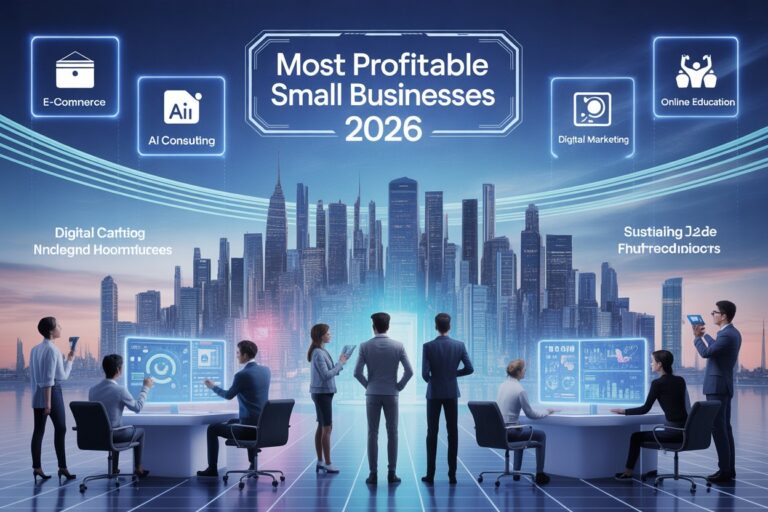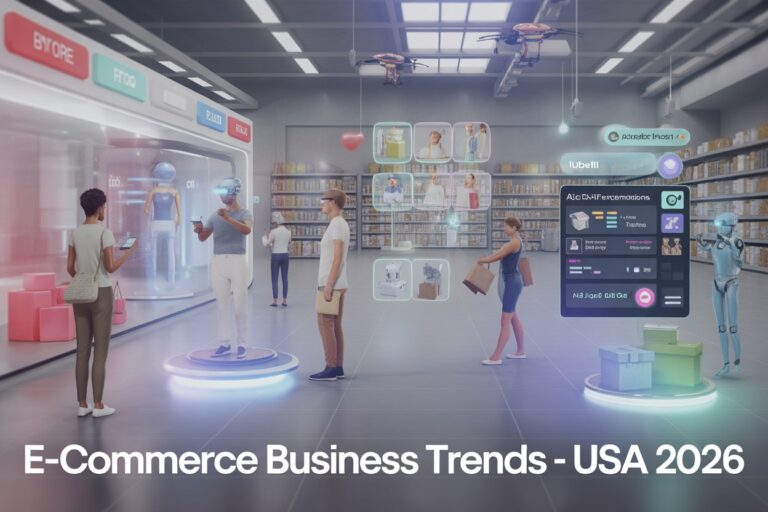Future Business Trends in USA
Introduction
Business success is no longer just about hard work — it’s about foresight. In a highly competitive and digital-first economy like the U.S., staying ahead of the curve is essential. The trends discussed in this article are based on current data, economic indicators, and innovation trajectories, providing a well-rounded outlook for the years to come.
Why Tracking Business Trends Is Important
Business trends aren’t just buzzwords; they reflect real changes in consumer expectations, technologies, and regulations. Entrepreneurs and businesses that align early with emerging trends often see greater profitability, customer loyalty, and long-term stability.

Benefits of Staying Ahead
- Improved strategic planning
- Increased adaptability
- Better investment decisions
- Higher brand credibility
Top 12 Future Business Trends in the USA
The following trends are expected to have a major influence on small and large businesses across the country.
1. Rise of AI and Automation
Artificial intelligence is already transforming industries — from chatbots in customer service to machine learning in logistics and finance.
Impact:
- Cost reduction through automation
- Smarter decision-making
- Need for ethical AI governance
2. Sustainable and Green Business Practices
Consumers are making environmentally conscious choices. Businesses offering sustainable alternatives, from packaging to production, will gain traction.
Examples:
- Biodegradable products
- Carbon-neutral operations
- Ethical sourcing
3. Remote Work and Virtual Teams
Post-pandemic work preferences have solidified remote work as a long-term norm. Companies are optimizing tools to support virtual collaboration.
Opportunities for Business:
- Remote team consulting
- Productivity tools and platforms
- Virtual HR and onboarding services
4. Subscription-Based Models
From digital media to household essentials, consumers prefer predictable, recurring purchases.
Popular Sectors:
- Software as a Service (SaaS)
- Meal kits
- Personal care products
5. Digital Healthcare Services
Telehealth, digital diagnostics, and health monitoring apps are creating new avenues in healthcare.
Trends:
- Virtual consultations
- AI health assistants
- Mental wellness platforms
6. E-commerce Expansion
The online shopping boom continues. New tools like AR (augmented reality) shopping and same-day delivery are enhancing the experience.
Future Focus:
- Personalized shopping journeys
- Voice commerce
- Mobile-first platforms
7. Cybersecurity Solutions
With digital growth comes vulnerability. Businesses are investing in cybersecurity to protect customer data and operations.
Emerging Needs:
- Cyber audits for small businesses
- AI-driven threat detection
- Compliance consulting
8. Personalized Marketing
Big data and AI are allowing businesses to customize user experiences, from product recommendations to targeted advertising.
Future Tactics:
- Behavioral email automation
- Hyper-targeted social ads
- Personalized product bundling
9. Gig and Creator Economy Growth
More individuals are monetizing their skills through freelancing, digital content, and marketplaces.
Business Opportunities:
- Platforms for creators
- Freelancer management software
- Microtask marketplaces
10. Financial Technology (Fintech)
Digital payments, investing apps, and decentralized finance (DeFi) tools are changing how people handle money.
Watch Areas:
- Mobile banking startups
- Peer-to-peer lending
- Crypto-regulated services
11. Business Process Outsourcing (BPO)
Outsourcing tasks like customer support, accounting, and logistics allows businesses to focus on core competencies.
Trends:
- Niche outsourcing (e.g., legal, marketing)
- Remote virtual assistants
- Pay-as-you-go service models
12. Reskilling and Online Education
As automation grows, workers need new skills. Online learning platforms and upskilling services are booming.
Areas of Growth:
- Tech-focused training
- Corporate education services
- Learning management software (LMS)
Industries Expected to Lead in 2026 and Beyond
These industries are expected to dominate the U.S. market in the near future:
- Technology and Software Development
- Renewable Energy and Sustainability
- Healthcare and Biotechnology
- Digital Education and Learning
- Financial Services (including Fintech)
Businesses within or supporting these sectors are likely to be highly profitable.
How Entrepreneurs Can Prepare for These Trends
H2: Practical Steps to Future-Proof Your Business
H3: 1. Invest in Digital Infrastructure
Build a fast, mobile-friendly website, use cloud tools, and embrace automation.
H3: 2. Stay Informed
Follow industry reports, join business communities, and monitor government policy updates.
H3: 3. Focus on Customer Experience
Personalize your services and communicate openly with your target audience.
H3: 4. Build Strategic Partnerships
Collaborate with tech experts, marketing agencies, or sustainability consultants.
H3: 5. Prioritize Data Security
Ensure compliance with data protection laws and implement security protocols.
Frequently Asked Questions
Q: Are these business trends confirmed by official sources?
A: These trends are derived from publicly available reports, government publications, and market research. Always cross-check with official data.
Q: Can small businesses adopt these trends?
A: Yes, many of these trends are accessible to small and medium-sized businesses, especially those willing to innovate and invest strategically.
Q: Is AI going to replace all jobs?
A: Not entirely. AI will automate some tasks, but it will also create demand for new roles focused on creativity, ethics, and strategy.
Q: How can I validate which trend suits my business?
A: Conduct market research, run small pilot tests, and gather feedback from your target audience.
Final Thoughts
Staying ahead of the curve in business requires more than awareness — it demands action. By understanding and adapting to these future business trends in the USA, entrepreneurs can build resilient, profitable, and purpose-driven ventures.
Remember, not all trends will apply to every business. The key is to align your vision, skills, and resources with the opportunities that make sense for you.






